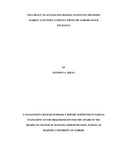The Impact of Automated Trading System on the Bonds Market Activities: Evidence From the Nairobi Stock Exchange

View/
Date
2010Author
Kiuna, Anthony G
Type
ThesisLanguage
en_USMetadata
Show full item recordAbstract
Many major exchanges have witnessed the implementation of automated systems owing to the large benefits that they convey. Scholars argue that electronic trading systems generally lower the fixed costs of running an exchange, which can translate into lower trading costs for market participants. There has been a controversy over whether the automation of a stock exchange market leads to better market performance or not. The Nairobi Stock Exchange was automated in 2006.
Since then, turnover in both the stock and bonds market have risen. Studies to establish the influence of automation have been done on the stocks market at the NSE but not on the bonds market. Thus, the present study sought to establish the impact of automated trading system on the performance of the bonds market on the Nairobi Stock Exchange.
A longitudinal survey design was used in this study. The population of interest was the bond market for the period June 2003 - June 2010. A census of the bond market was therefore performed. Secondary data was collected from the Nairobi Stock Exchange market, Business Daily and stock brokerage firms. The data on bond prices, turnover, and deals were collected.
The data was organised using MS Excel and then entered into the SPSS software. The analysis was performed using paired t-test, Pearson correlation, and descriptive analysis.
The study found that bond turnover, pnces, and deals were substantially higher for periods after stock market automation than before the automation. The t-tests showed that the observed differences were significant (p<0.05). The study concludes that automation of the bond market led to an increase in the bond market turnover, prices, and bond market deals.
The study also concludes that bond market automation significantly led to an increase in bond turnover, prices, and deals. The study recommends that there is need for other markets which have not automated their trading systems to take the initiative to do so. Firms wishing to list their bonds on the Nairobi Stock Exchange should do so to take advantage of the improved efficiency that had led to better pricing. Given the increased number of deals due to automation, those wishing to invest in the bond market should do so because the market is able to capture as many deals per day as possible with the automation.
Publisher
University of Nairobi, Kenya
